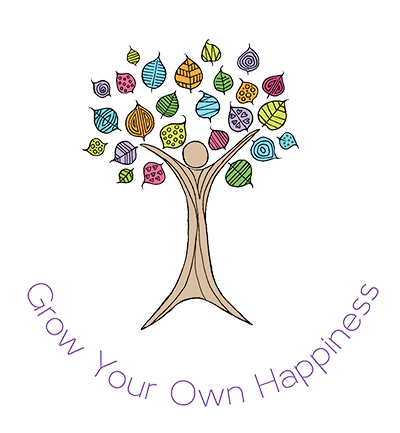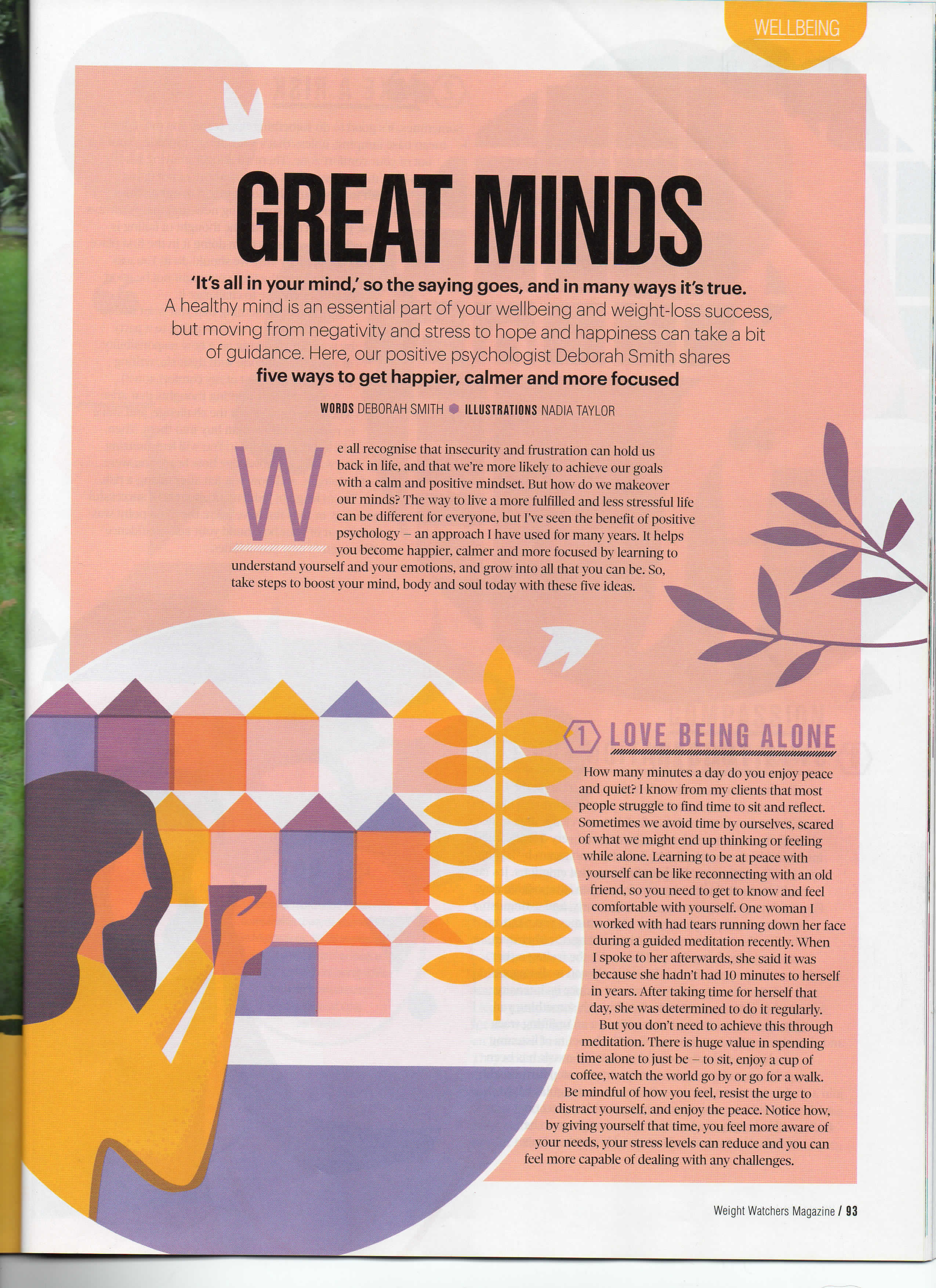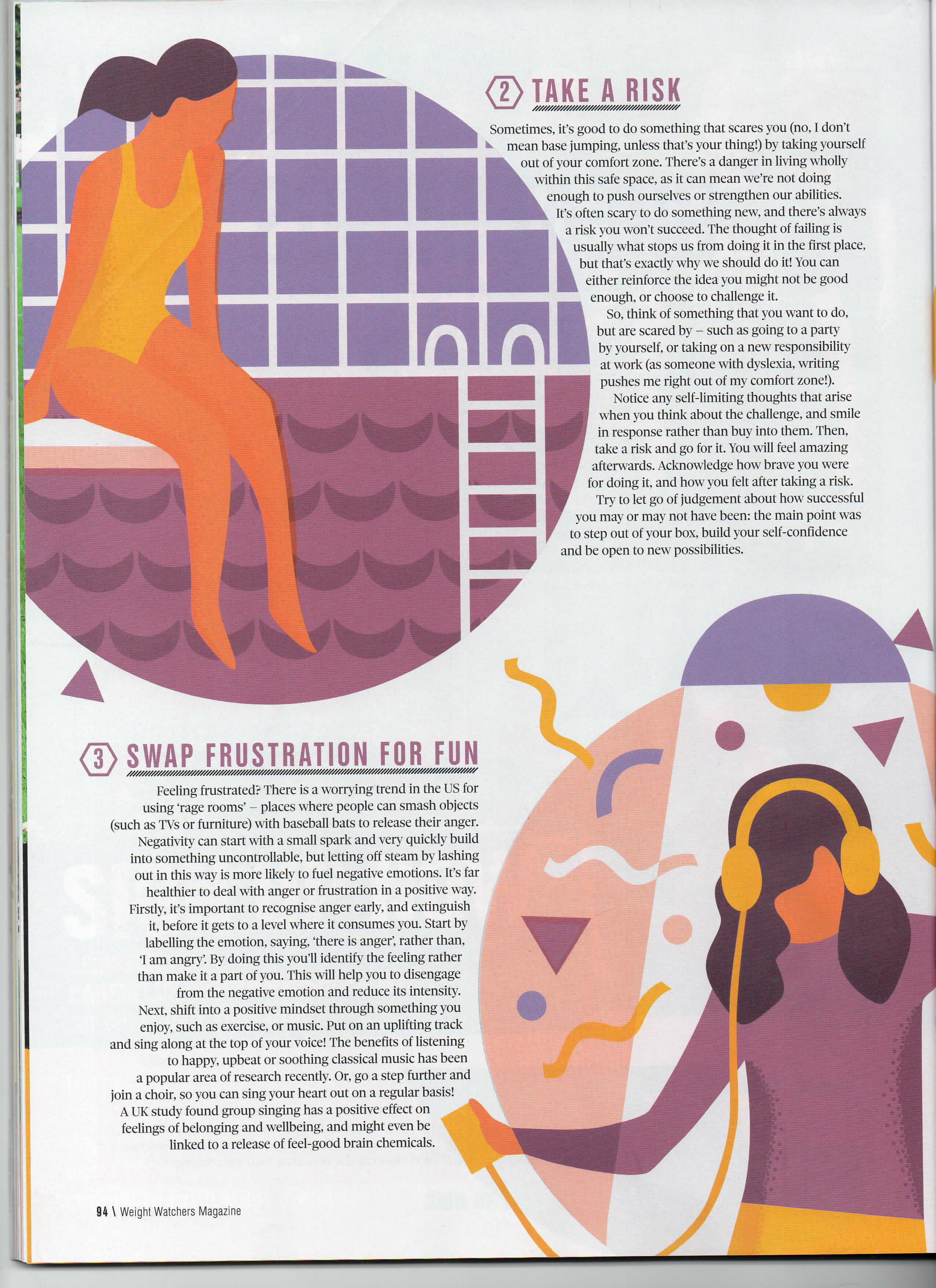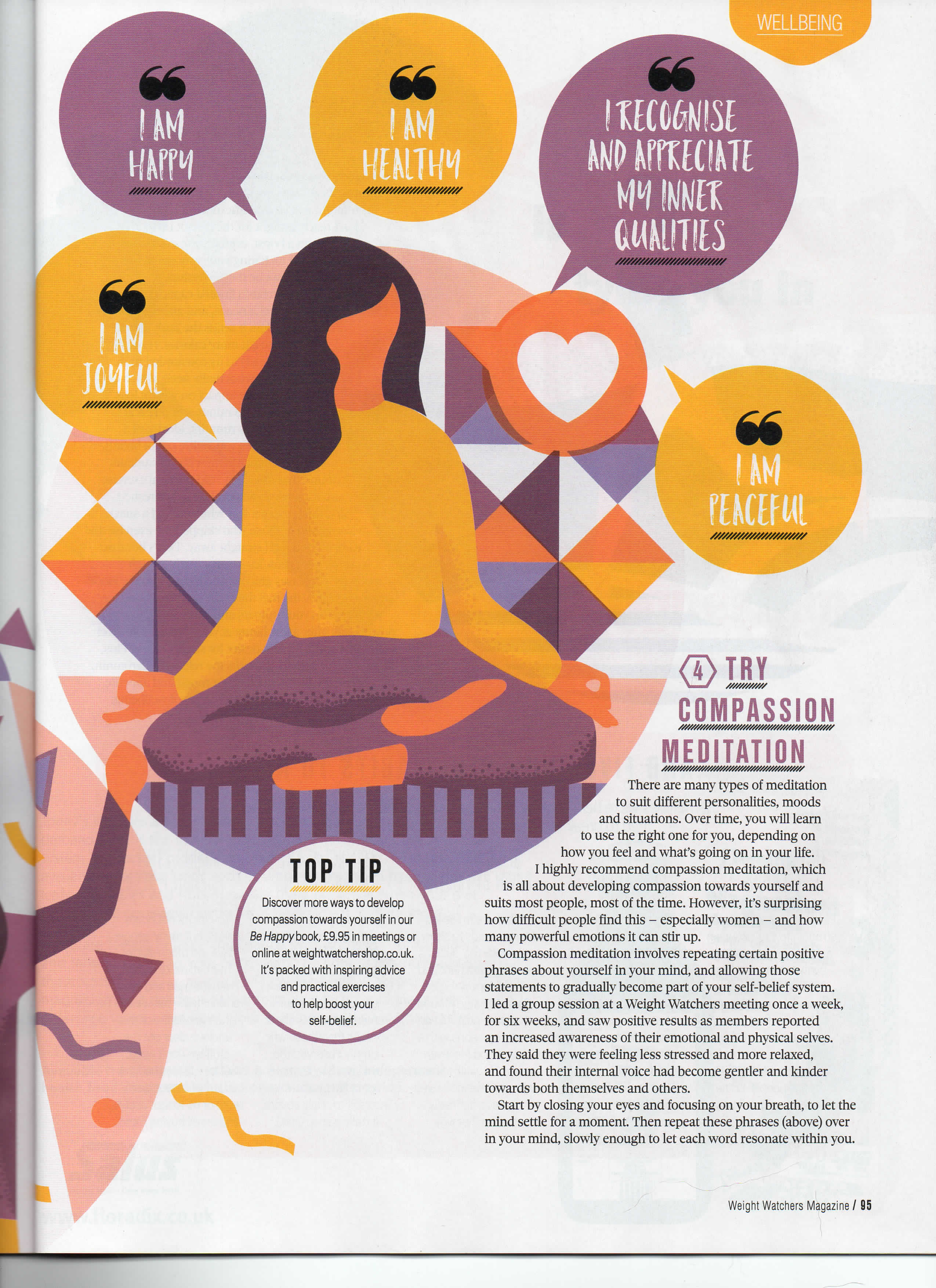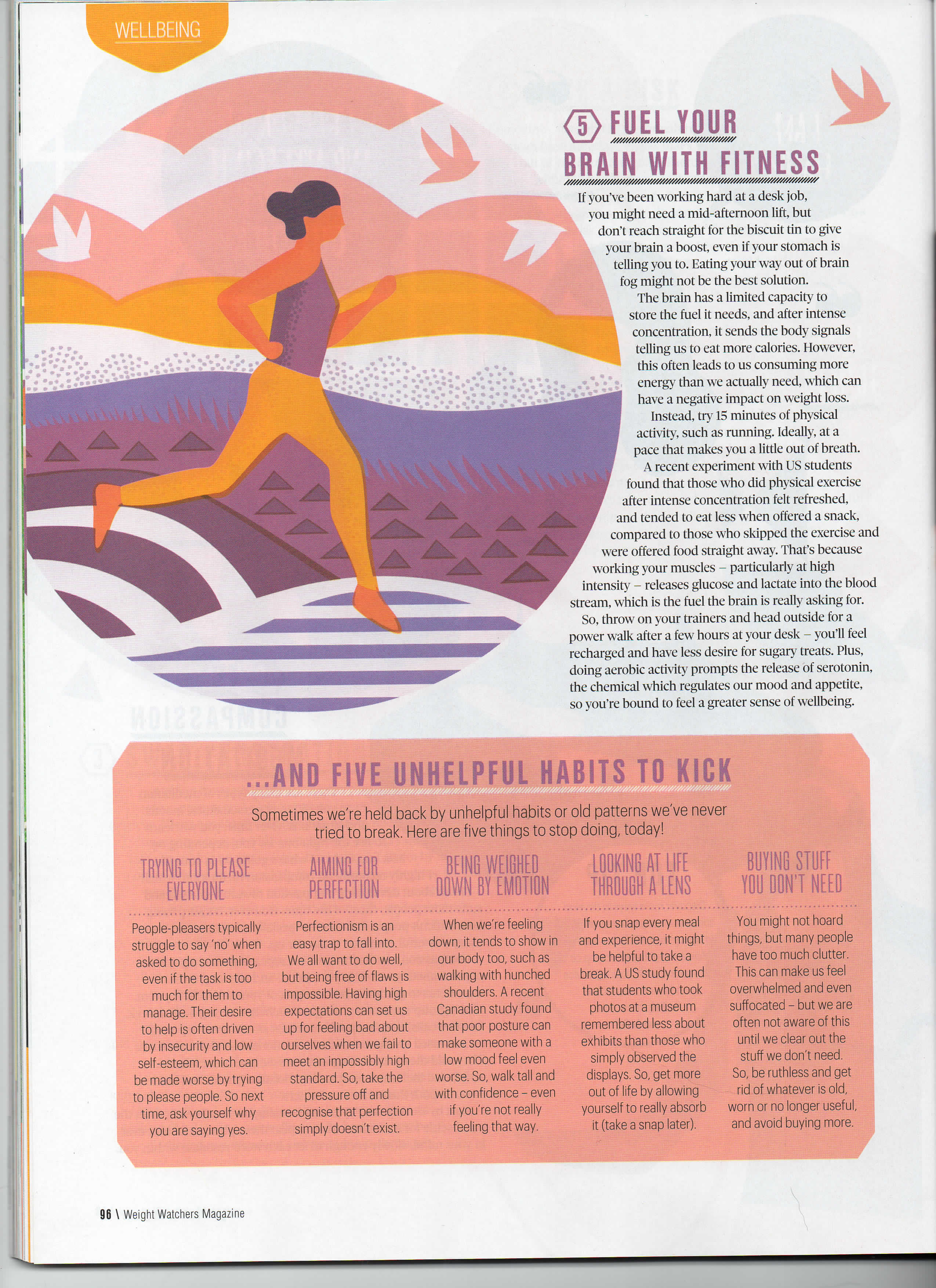WELLBEING
‘It’s all in your mind,’ so the saying goes, and in many ways it’s true.
A healthy mind is an essential part of your wellbeing and weight-loss success, but moving from negativity and stress to hope and happiness can take a bit of guidance. Here, our positive psychologist Deborah Smith shares five ways to get happier, calmer and more focused.
We all recognise that insecurity and frustration can hold us back in life, and that we’re more likely to achieve our goals with a calm and positive mindset. But how do we makeover our minds? The way to live a more fulfilled and less stressful life can be different for everyone, but I’ve seen the benefit of positive psychology – an approach I have used for many years. It helps you become happier, calmer and more focused by learning to understand yourself and your emotions, and grow into all that you can be. So, take steps to boost your mind, body and soul today with these five ideas.
1 LOVE BEING ALONE
How many minutes a day do you enjoy peace and quiet? I know from my clients that most people struggle to find time to sit and reflect. Sometime we avoid time by ourselves, scared of what we might end up thinking or feeling while alone. Learning to be at peace with yourself can be like reconnecting with an old friend, so you need to get to know and feel comfortable with yourself. One woman I worked with had tears running down her face during a guided meditation recently. When I spoke to her afterwards, she said it was because she hadn’t had 10 minutes to herself in years. After taking time for herself that day, she as determined to do it regularly. But you don’t need to achieve this through meditation. There is huge value in spending time alone to just be – to sit, enjoy a cup of coffee, watch the world go by or go for a walk. Be mindful of how you feel, resist the urge to distract yourself, and enjoy the peace. Notice how by giving yourself that time, you feel more aware of your needs, your stress levels can reduce and you can feel more capable of dealing with any challenges.
2 TAKE A RISK
Sometimes, it’s good to do something that scares you (no, I don’t mean base jumping, unless that’s your thing!) by taking yourself out of your comfort zone. There’s a danger in living wholly within this safe space, as it can mean we’re not doing enough to push ourselves or strengthen our abilities. It’s often scary to do something new, and there’s always a risk you won’t succeed. The thought of failing is usually what stops us from doing it in the first place, but that’s exactly why we should do it! You can either reinforce the idea you might not be good enough, or choose to challenge it.
So think of something that you want to do, but are scared by – such as going to a party by yourself, or taking on a new responsibility at work (as someone with dyslexia, writing pushes me right out of my comfort zone!). Notice any self-limiting thoughts that arise when you think about the challenge, and smile in response rather than buy into them. Then, take a risk and go for it. You will feel amazing afterwards. Acknowledge how brave you were for doing it, and how you felt after taking a risk. Try to let go of judgment about how successful you may or may not have been; the main point was to step out of your box, build your self-confidence and be open to new possibilities.
3 SWAP FRUSTRATION FOR FUN
Feeling frustrated? There is a worrying trend in the US for using ‘rage rooms’ – places where people can smash objects (such as TVs and furniture) with baseball bats to release their anger. Negativity can start with a small spark and very quickly build into something uncontrollable, but letting off steam by lashing out in this way is more likely to fuel negative emotions. It’s far healthier to deal with anger or frustration in a positive way. Firstly it’s important to recognise anger early, and extinguish it, before it gets to a level where it consumes you. Start by labeling the emotion, saying, ‘there is anger’, rather than ‘I am angry’. By doing this you’ll identify the feeling rather than make it a part of you. This will help you disengage from negative emotion and reduce its intensity. Next, shift into a positive mindset through something you enjoy, such as exercise or music. Put on uplifting track and sing along at the top of your voice! The benefits of listening to happy, upbeat or soothing classical music has been a popular area of research recently. Or, go a step further and join a choir, so you can sing your heart out on a regular basis! A UK study found group singing has a positive effect on feelings of belonging and well being, and might even be linked to a release of feel-good brain chemicals.
4 TRY COMPASSION MEDITATION
There are many types of meditation to suit different personalities, moods and situations. Over time, you will learn to use the right one for you, depending on how you feel and what’s going on in your life. I highly recommend compassion meditation, which is all about developing compassion towards yourself and suits most people, most of the time. However, it’s surprising how difficult people find this – especially women – and how many powerful emotions it can stir up.
Compassion meditation involves repeating certain positive phrases about yourself in your mind, and allowing those statements to gradually become part of your self-belief system. I led a group session at a Weight Watchers meeting once a week for six weeks, and saw positive results as members reported an increased awareness of their emotional and physical selves. They said they were feeling less stressed and more replaced, and found their internal voice had become gentler and kinder towards both themselves and others.
Try this Compassion Meditation that Deborah has done for you.
5 FUEL YOUR BRAIN WITH FITNESS
If you’ve been working hard at a desk job, you might need a mid -afternoon lift, but don’t reach straight for the biscuit tin to give your brain a boost, even if your stomach is telling you to. Eating your way out of brain fog might not be the best solution. The brain has a limited capacity to store the fuel it needs, and after intense concentration, it sends the body signals telling us to eat more calories. However, this often leads us to consuming more energy than we actually need, which can have a negative impact on weight loss. Instead, try 15 minutes of physical activity, such as running. Ideally, at a pace that makes you a litle out of breath. A recent experiment with US students found that those who did physical exercise after intense concentration felt refreshed, and tended to eat less when offered a snack, compared to those who skipped the exercise and were offered food straight away. That’s because working your muscles – particularly at high intensity – releases glucose and lactate into the bloodstream, which is the fuel the brain is really asking for. So throw on your trainers and head outside for a power walk after a few hours at your desk – you’ll feel recharged and have less desire for sugary treats. Plus, doing aerobic activity prompts the release of serotonin, the chemical which regulates our mood and appetite, so you’re bound to feel a greater sense of wellbeing.
… AND FIVE UNHELPFUL HABITS TO KICK
Sometimes we’re held back by unhelpful habits or old patterns we’ve never tried to break. Here are five things to stop doing, today!
TRYING TO PLEASE EVERYONE
People-pleasers typically struggle to say ‘no’ when asked to do something, even if the task is too much for them to manage. Their desire to help is often driven by insecurity and low self-esteem, which can be made worse by trying to please people. So next time, ask yourself why you are saying yes.
AIMING FOR PERFECTION
Perfectionism is an easy trap to fall into. We all want to do well, but being free of flaws is impossible. Having high expectations can set us up for feeling bad about ourselves when we fail to meet an impossibly high standard. So, take the pressure off and recognise that perfection simply doesn’t exist.
BEING WEIGHED DOWN BY EMOTION
When we’re feeling down it tends to show in our body too, such as walking with hunched shoulders. A recent Canadian study found that poor posture can make someone with a low mood feel even worse. So, walk tall and with confidence – even if you’re not really feeling that way.
LOOKING AT LIFE THROUGH A LENS
If you snap every meal and experience, it might be helpful to take a break. A US study found that students who took photos at a museum remembered less about exhibits than those who simply observed the displays. So, get more out of life by allowing yourself to really absorb it (take a snap later).
BUYING STUFF YOU DON’T NEED
You might not hoard things, but many people have too much clutter. This can make us feel overwhelmed and even suffocated – but we are often not aware of this until we clear out the stuff we don’t need. So, be ruthless and get rid of whatever is old, worn or no longer useful, and avoid buying more.
Great Minds Feature for Weight Watcher’s Magazine, 2017
